
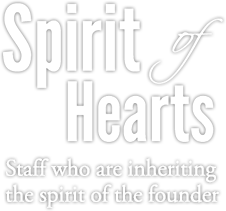
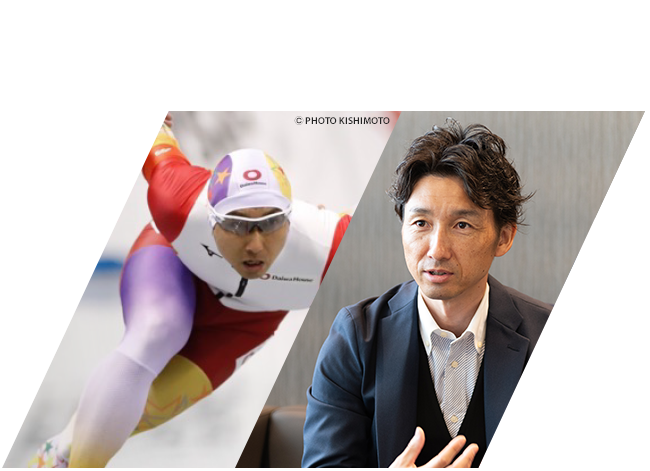
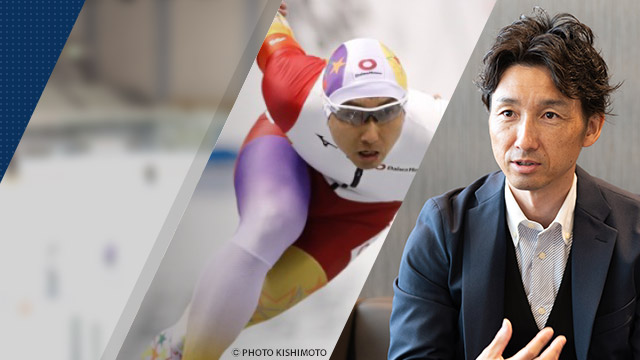 “An Athlete’s
“An Athlete’s
Flying Start to His Second Life”
A three-time Olympic athlete has stepped into his second career in sales
for Daiwa House Industry. Beyond struggles and challenges, lies his goal.

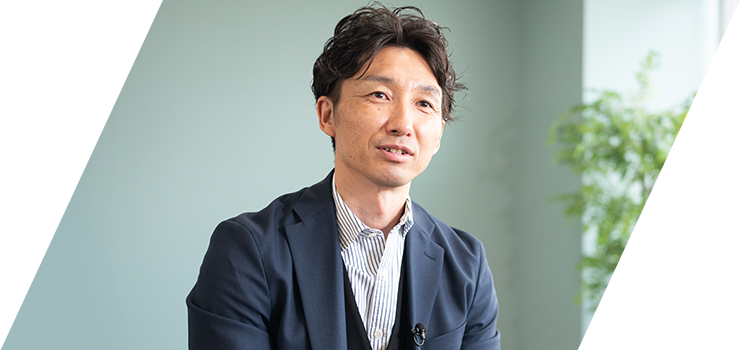
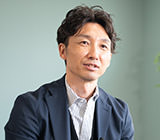

![]()
![]()
![]()



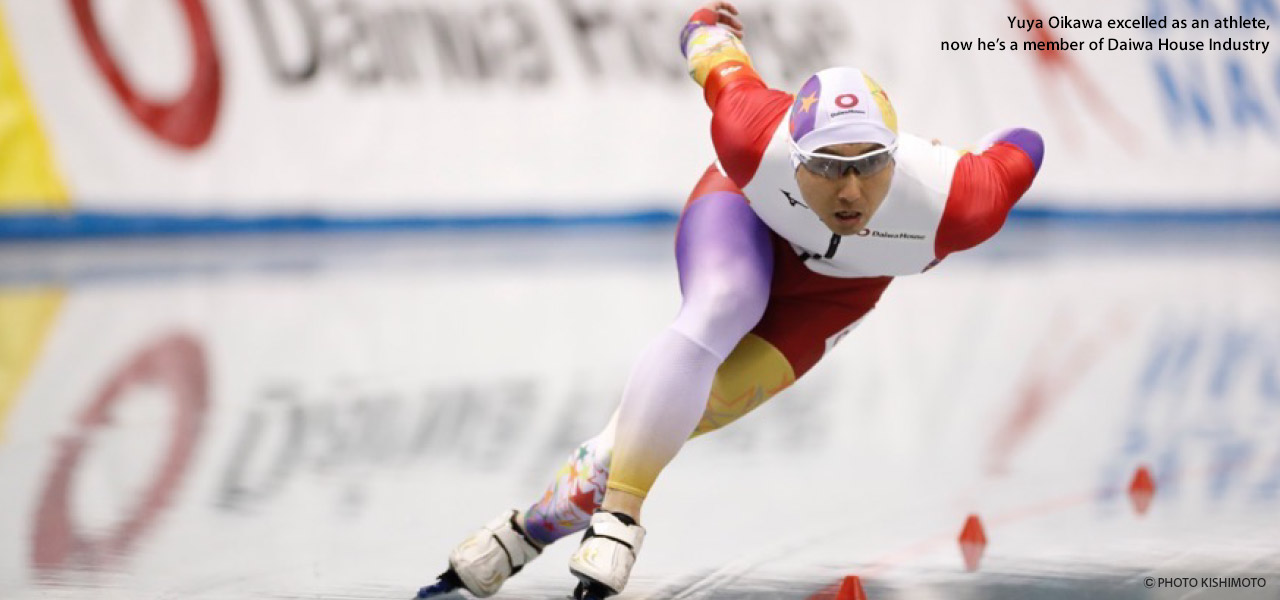
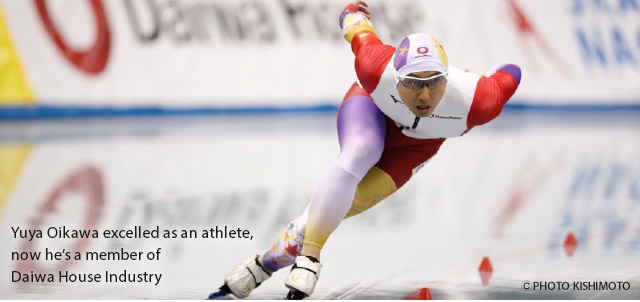

An Olympian who hated to skate
Oikawa began his skating career at the age of three, and was competing from age six. But no matter how much he practiced, winning was always just out of reach. Small in stature he was a head shorter than his classmates. His father’s direction was so severe that he wanted to run away, and then there was the bitter cold of Hokkaido’s Tokachi Plain. “I hated skating. I wanted to quit so many times.”
With such a loathing of practice, Oikawa became reclusive and shy, and not at all on the path toward notching a win. But as a youth who hated to lose, he eventually grew into a top athlete who would compete on the world stage.
That stage would be the men’s 500-meter speed skating at the 2006 Torino Olympics. There he would come in at 4th place, the top-scoring Japanese athlete, but from 2005 to 2010 at the World Cup, he was the all-around 100-meter champion in three seasons. Then in the 2009 World Cup he set a then-Japanese record in the 500-meter competition. He’s participated in three consecutive Olympics, starting with Torino, followed by Vancouver and Sochi.
Chasing the medal that proved elusive in Torino, Oikawa skated on. “I’ll fight harder, and go beyond who I was last year.” People say that athletes peak in their late 20s, but one’s technique will sharpen even further from there. When Oikawa was 38, at a lowland rink that made gaining speed a challenge, he set a personal best in a 500-meter race. He still had it. He could have even more.
Still, there would be a day when he would stop and walk down a different path. His body, breaking down, was at its limit. He decided that his last race would be a day in 2023. It was during that competition that an announcement echoed across the venue praising Oikawa’s career, and the applause was never ending, even while he skated on. Having reached the finish line, Olympic medalists with whom he had competed and other friends bestowed to him a bouquet of flowers that caused his tears to well up inside and overflow.
At age 42, Oikawa altered course from an athlete employee of Daiwa House Industry to become a sales-position employee, in what was the start of his second career. One year later, he smiled wryly as he commented, “From one thing to another, it’s completely different than before. An athlete’s experience is useless. I rack my brains every day.” However, after almost 30 years in the skating world, he got up and pushed himself no matter how many times he fell, so people who were struck by his dedication reached out to him and took him to the next stage. It’s that very experience that is his treasure, his strength.
It was the training during his elementary school days—“the most difficult time in my life”—that gave him the fundamentals to support his subsequent competitive life. Then, a turning point arrived when he was in junior high school. Finding long-track races, which is what he was training for at the time, not to his liking, Oikawa’s heart silently rejoiced when, after having suffered an injury, his doctor told him that skating would not be possible anymore. His father, though, said, “Then it’s short-track races. Let’s save the option of quitting skating for the future.” When he reluctantly returned to training, he experienced a thrilling new sensation of speed.
Continuing on through high school and college, however, his racing results failed to improve. When at a race in his freshman year in college he lost by a landslide, the humiliation drove him to tell the captain of the team, “I’m definitely going to quit this time.” However, the reply Oikawa received put an end to that thinking: “You’ve hit rock bottom. You can only go up from here,” causing him to reflect on himself. The problem was that when he raced, his mind went blank with all his excessive expectations of himself and being overly concerned about what others thought. “Have you practiced enough to think about what would happen if you failed? No one bothers with such slow athletes.”
Ever since his childhood his father told him, “If you want to win you will have to train two or three times as hard as the other guy.” But with schoolwork it was difficult to find the time. If that’s the case, let’s think two or three times as much as the other guy. In what way can speed be increased? How to skate more efficiently? Descending down on a stairway he would shift his body as if coming around a curve. To sharpen his reflexes, he would step instantaneously into the street the moment the crosswalk light turned green. Road bike training did not waste a single pedal stroke, which seemed to be just like skating movement.
The efforts he made finally came to fruition. In his senior year in university, Oikawa came out on top at the Japan Collegiate Skating and Ice Hockey Federation (intercollegiate) competition. Standing at the start line, the ambient noise vanished. Off the mark, cheers swirled around him as if he were underwater. It was the first time he was in the “zone,” that place of extreme concentration, in what he recalled as “the best race of my life.”
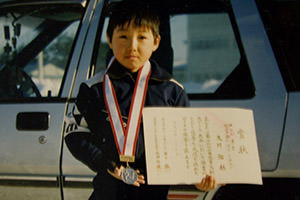
Competing since his elementary school days
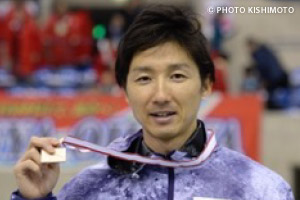
Sochi Olympics speed skating
Japan National Team Selection Committee
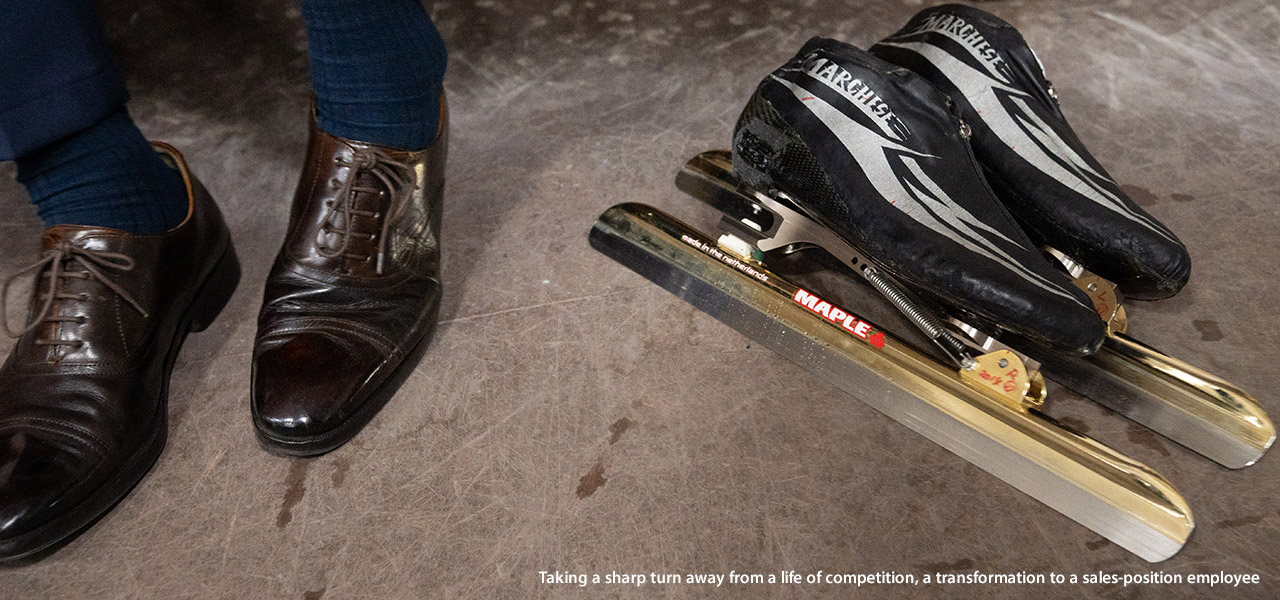
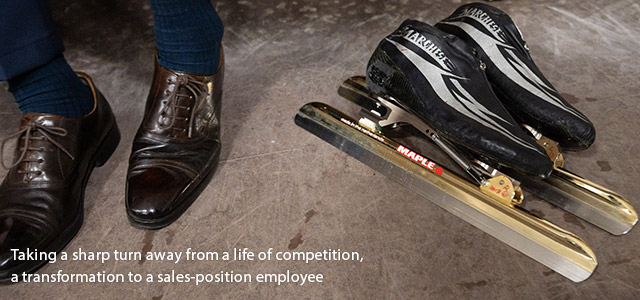

The transformation
from athlete to sales staff
In recognition of his intercollegiate victory, he found a job that would support his athletic activities. After the Torino and Vancouver Olympics, that company’s skating club was discontinued, but through the introduction of a fellow athlete who was a member of Daiwa House Industry, Oikawa was able to join the company as an athlete employee.
Oikawa clearly remembers what the general manager of the Daiwa House Industry skating club told him at the time: “Now is the time to give skating your all. You can keep skating until you feel like quitting, so get it done. Whether you find something you want to do after you retire and go down a different path, or stay on as an employee, I'll support you either way.”
At competitions there were many employees from the Head Office and branches near the venue who came to cheer him on. While it was encouraging, it was also a source of pressure, and that made him anxious about being able to put on a good performance. About a week before each race, he would offer a feeble complaint of “I’m so out of it. This is going to be hopeless.” The response from those who heard that was, it’s started again. Let’s not listen to this crybaby. So, continuing to voice his concerns, on the day of the race his mood would suddenly recover.
Negative thinking touches on risk management for athletes. They anticipate possible obstacles, probe for weaknesses in themselves, develop strategies to improve, and try again and again. In that way Oikawa continued to challenge his potential.
His post-retirement career was no different in the way he chose to challenge himself. While he would have liked to have been engaged in sports for his entire life, up until then skating had been his sole pursuit. Would it be alright to move forward on his current path without exploring other worlds? If he worked as a business person, maybe there would be something new to see.
In an interview with the company, he mentioned his many campaigns and training camps, and conveyed his desire to return to Hokkaido, where his family was waiting. For Oikawa, who stated that he had “nothing but fear” before doing a job he had no experience at, his family had his back.
The company assigned Oikawa to the Marketing Support Office at the Hokkaido Branch. His job is to support sales activities by connecting “information” such as customer requests to branch offices and Group companies. Customers include businesses, financial institutions, and accounting firms. Other customers may be their employees who are considering purchasing their own homes.
When Oikawa was an athlete employee, a friend had mentioned that he “wanted to buy a house.” So, Oikawa deftly contacted the department in charge to make the introduction. As a result, he achieved recognition for having the top sales figures for a non-operating employee in the first half of the year. Now he will be doing the same sort of job as his official duties.
Now, almost every day Oikawa visits customers or real estate companies together with his supervisor or colleagues. He also makes solo visits, but his innate personality holds him back. “I’m shy, and have insufficient specialized knowledge. So, I can’t take that first step,” he says with a sense of self depreciation. Those customers who know of Oikawa’s transformation from an athlete engage with him in lively conversation, but to those who are not acquainted with him, he appears to be a 40-something veteran employee.
“Even after a year I can’t do a thing,” says a panicked Oikawa. But he’s a hard worker, and passed the housing exam on his first try. In humility, he stated, “I was just lucky, I didn’t pass even one of my mock exams.” Nonetheless, the pass rate is low, and luck by itself won’t get you by. Studying for the test starts with checking what the terminology means. So when he woke up in the morning, he got into the habit of solving dozens of problems while still under the covers. That was just like in elementary school when he would do dozens of push-ups, sit-ups and other exercises as soon as he woke up.
During morning meeting speeches, where others talk about economic news and current events, Oikawa looks for topics that will trigger communication with customers. He goes in-depth in discussing hot topics on social networking sites and other news, delivered in a PowerPoint presentation. This is his practice for giving presentations, and he’s happy when a colleague thanks him by saying, “I'll use what you just said at the place I'm visiting.”
It may be Oikawa's temperament to seek out ways to be different from others. His father told him to “make up for any weaknesses with your strengths,” and he’s honed an ability to be quick off the mark, which is something he’s good at. Normally, at the starting line, the body would be facing forward, but Oikawa kept his poised in a sideways twist. The ingenious form was called the world's fastest tornado start. He’s not looking to do things like other people. He still struggles and looks for ways to make up for a slow start in the working world.
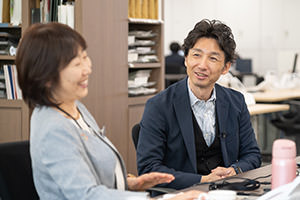
Starting with his colleagues, Oikawa works in an office environment enriched by its people
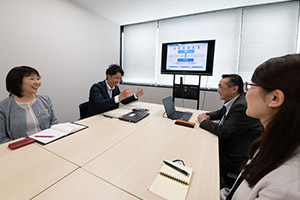
A meeting in the Marketing Support Office
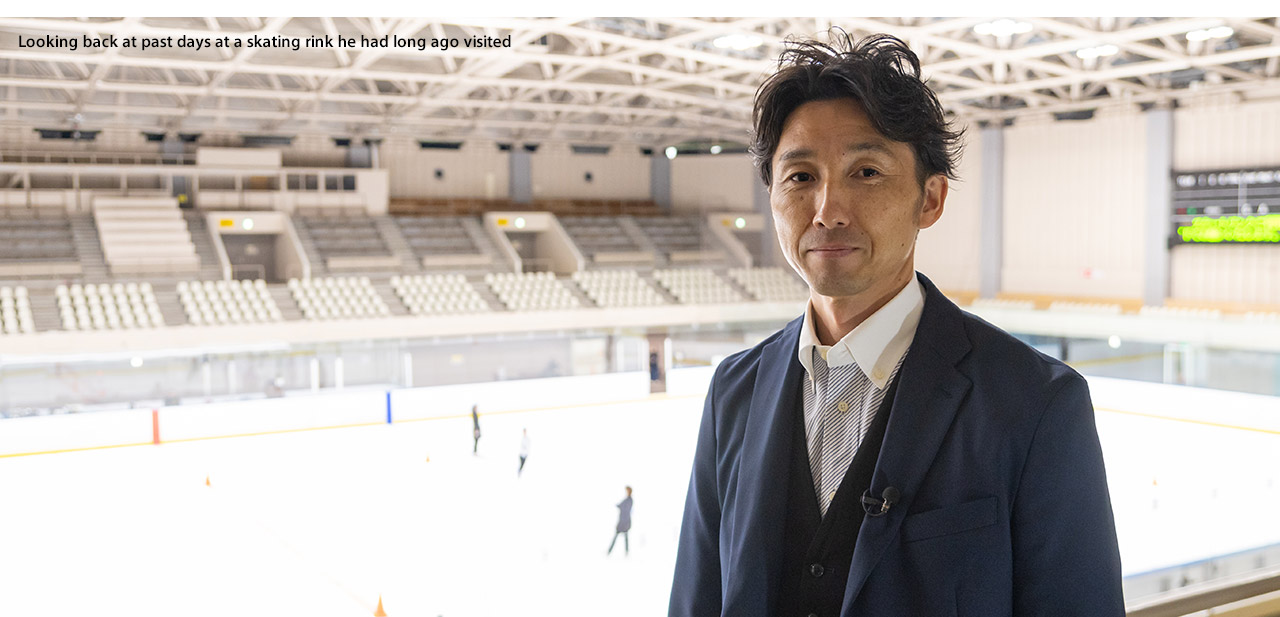
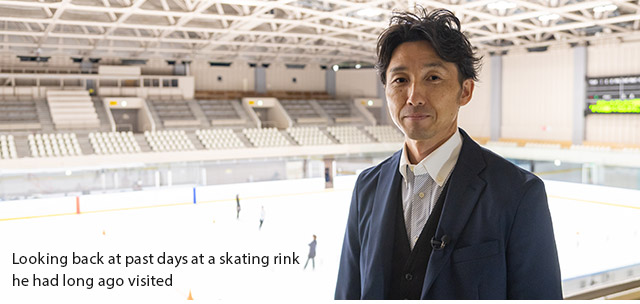

Wanting to do his utmost to develop
the sports world
So having transformed himself from a top athlete, how do people around Oikawa perceive him in his second year in the working world.
As his colleague tells it, “Oikawa is a gentleman with a sense of humor. It’s in his character to dig deep into things, and I respect him as a hard-working person.” The sales staff with whom he calls on customers talk about the many questions he gets from their management, things like “When you thought about quitting skating, how did you get over it and keep going?” Maintaining one’s mental state when confronted by challenges and having the self-discipline technique to stay motivated over the long term are also useful in the business world.
Staff senior to him tell of his “wonderful personality,” and “In our job, it is necessary to be proactive in sales, but “personality” is just as important. Oikawa gets down on himself and worries quite a bit if sales do not go well, but there is a lot of waste in this job. He should just cut off and move on to the next thing.” A sincere personality is the foundation for building a relationship of trust with customers. The day when that trust reflects to sales performance will certainly come.
The head of the Marketing Support Office tells it this way: “The Marketing Support Department has hundreds of employees across the country. Many of them are in factories, in purchasing departments, in Group companies, or in non-sales positions. Oikawa comes from the most remote of places to tackle this job. His presence is a great encouragement to those with no sales experience and will have a very positive impact on the entire department!”
And Oikawa’s family, the driving force behind his long skating career and his transition to a businessperson, has his back. They all believe in his potential and that he will soar in the future. Oikawa’s work ethic and willingness to tackle challenges is encouraging to both new employees and mid-career hires, is an example for children, and a role model that that will help people get through difficult times.
Moreover, Oikawa leverages the secondary employment system in his public speaking and in giving guidance in skating classes. For instance, he’s taken the stage as a guest speaker at events and seminars for customers sponsored by Daiwa House Industry. Whether it be at a large-scale hotel venue or in a small meeting room, Oikawa gives it his all, and tells of his experience as a top athlete and the insights he’s gained.
In winter, Oikawa goes to children’s skating classes. “If anyone, young or old, male or female, wants to try skating,” he says, “I would like to teach them as long as they are able to move and perform. I wish I could do something for the development of the sporting world.”
These activities, which can be considered his lifework, are also linked to the many sports and cultural activities that the Daiwa House Group sponsors. Oikawa himself embodies the spirit of the founder’s words, “A company is a public institution of society,” and that passing on culture and art is another important role as a company.
Oikawa knows both the confidence of the athletes who receive support and the struggles of worrying about a second career. As a player and a fan, he also knows the joy of a lifelong involvement in sports. His experiences as a former athlete provide hope for athletes in the same situation and serve as a guidepost for the Daiwa House Group, which contributes to society through sports sponsorship.
Oikawa has a saying that he learned from his father, and he has taken it as a life lesson: “One who knows is no match for one who likes. One who likes is no match for one who enjoys.” (Confucius). Knowing things does not extend to liking them. Just liking something doesn't extend to those who enjoy it. “I'm at the point in my career where I know what I'm doing, but I haven't gotten to the point where I enjoy it. Still, someday I hope to say these words with confidence.”
Still in his second year off the mark, from his “Go to the start” position, he’s been “ready,” and now the signal has sounded. He is on his way, one foot in front of the other, toward his goal that lays far ahead.
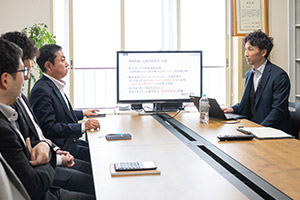
Giving a presentation to customers
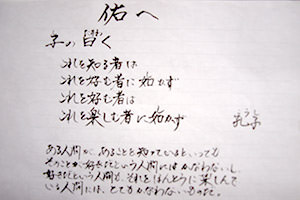
Oikawa’s father offered these words from Confucius
*Stated information is as of June 2024.
-
 "A Free Hand to Design a New World of Luxury Houses"
"A Free Hand to Design a New World of Luxury Houses"
-
 "The next mission in construction business"
"The next mission in construction business"
-
 "An Athlete’s Flying Start to His Second Life"
"An Athlete’s Flying Start to His Second Life"
-
 "Tackling the Challenges of Carbon Neutrality"
"Tackling the Challenges of Carbon Neutrality"
-
 "Building Close Relationships with Our Customers"
"Building Close Relationships with Our Customers"
-
 "Transforming the Construction Sector with DX"
"Transforming the Construction Sector with DX"
-
 "Bringing Ever-More Joy to Travel in Japan"
"Bringing Ever-More Joy to Travel in Japan"
-
 "Regeneration" Arises from New Construction
"Regeneration" Arises from New Construction
-
 "An Enduring Spirit of Hospitality"
"An Enduring Spirit of Hospitality"
-
 "Collaborating with 16 creators invited from around the world"
"Collaborating with 16 creators invited from around the world"
-
 "Passing Down Hometown to Future Generations with Renewable Energy"
"Passing Down Hometown to Future Generations with Renewable Energy"
-
 "The twenty-first century will be wind, solar, and hydro"
"The twenty-first century will be wind, solar, and hydro"
-
 "Be a Pioneer in the Design Revolution"
"Be a Pioneer in the Design Revolution"
-
 "Building better places to live through partnership between the public and private sectors"
"Building better places to live through partnership between the public and private sectors"
-
 "Supporting the foundations of the nation"
"Supporting the foundations of the nation"
-
 "Continuing to work the rest of life"
"Continuing to work the rest of life"
-
 "Doing our best to support post-disaster reconstruction"
"Doing our best to support post-disaster reconstruction"
-
 "Defying common wisdom in housing construction"
"Defying common wisdom in housing construction"
-
 "Develop the American market!"
"Develop the American market!"
-
 "Exporting Japanese industrial parks"
"Exporting Japanese industrial parks"
-
 "Industrializing agriculture"
"Industrializing agriculture"

